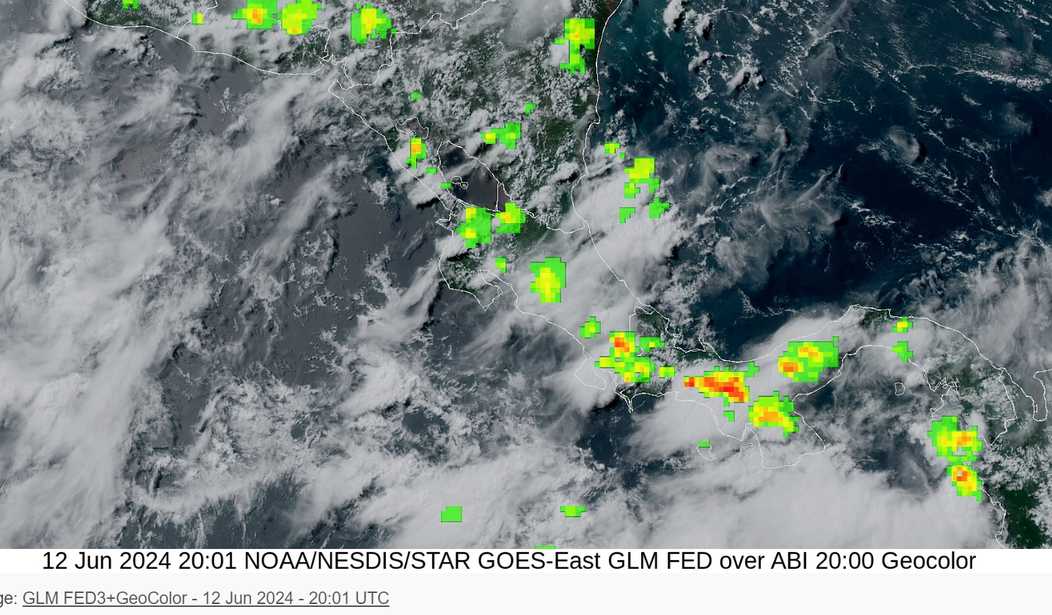Droughts come, droughts go. Some last a little longer than others. Many are part of recurring climatological patterns as evinced in the historical record in any given area documented via tree rings and sediment layers back through time immemorial.
Some last nowhere near as long as the folks who make their living off of the panic from them would wish.
That's kind of the story in Panama right now.
For all the climate cultist alarm bells banging away like claxons ordering a ship abandonment last year, and especially this past fall and this winter...we're not hearing much of anything out of them right now.
First, there was that awkward study undercutting the narrative.
The climate hoaxers at World Weather Attribution @WWAttribution pretend to be even handed by arbitrarily deciding that emissions are not to blame for low rainfall at Panama Canal.
— Steve Milloy (@JunkScience) May 1, 2024
Don't be fooled. WWA is just making it up as it goes along so as to advance the climate hoax.… pic.twitter.com/7RS8tPpgIY
And then the drought itself kinda took a break.
So this is why you're not hearing much about it.
The Panama Canal Authority (ACP) will increase the current number of daily transits from 32 to 33, effective July 11. Furthermore, this number will increase to 34 as of July 22, following the current and projected level of Gatun Lake for the coming weeks, and due to the arrival of the rainy season in the Panama Canal watershed.
Additionally, an increase in draft from 13.7 m to 14 m was announced, effective June 15.
Since May last year, the ACP has had to cut back daily transits on the waterway as the nation fought a massive drought – the worst on record.
As I posted earlier, the good news started rolling in during March, and while no one wanted to prematurely dance a jig, they were hopefully optimistic.
...Two weeks ago, low and behold, there was yet another announcement. After completing some maintenance work, they again increased the transit numbers, and, even more important, the draft size of the ships allowed through the canal.
...On completion of these works ACP has announced measures that will increase the number of daily transits from 24 to 32, as water levels have improved following the drought last year that caused the implementation of restrictions.
That caused a cascade of readjustment in the larger shipping companies that had been improvising transit methods since their huge ocean cargo ships couldn't gain access to the canal. For example, shipping giant Maersk had offloaded its huge boats on the Pacific side, transported the containers on a train across the isthmus, and reloaded them aboard a boat on the Atlantic side. It was a pain, but still shorter and safer than going all the way around Cape Horn.
This historic average is 34-38.
They're running ahead of projections for being able to open up the traffic numbers and increase the larger Panamax lock passages, and not a minute too soon.
Panama Canal Authority increases allowable draft ahead of schedule
With the early arrival of the rainy season, the Panama Canal Authority (ACP) has increased the maximum authorized draft to 45ft.
...Originally scheduled to take effect in mid-June, the increase in the allowable draft was brought forward as a result of the onset of the rainy season in the Panama Canal Watershed. Since May 26, the water levels of Gatun and Alajuela Lakes have, for the first time in 2024, risen above levels recorded on the same date in 2023.
As of May 26, the number of daily transits in the Panamax Locks increased from 17 to 24, and starting June 1 the number of daily transits in the Neo-Panamax Lock will increase from seven to eight. This brings the number of vessels passing along the canal daily back up to thirty-two, close to pre-drought numbers.
Now they're still going to have to address the water issue simply because the new locks use so much more fresh water, and the population of Panama has increased exponentially. If everyone is to co-exist during drought times - and they do come - there needs to be both additional water sources and conservation of every drop.
With global trade beginning to show signs of weakness, bringing the Canal back up to speed is essential both for our security in this corner of the world and for safeguarding trade in the Americas.
The Panama Canal is essential for the Americas’ trade landscape.
— latinometrics (@LatamData) June 6, 2024
According to UNCTAD, nearly a quarter of Ecuador's, Chile's, and Peru's trade volume goes through it. 12% of US trade, worth $5T, also passes through the canal. pic.twitter.com/ENfHqWXbt7
This is nothing but good news. It also gives me another chance to post some more canal videos - the thing is a marvel.
They pack them in like sardines so not an inch of space is wasted.
The Panama Canal lock is a lock system that lifts ships up 85 feet (26 metres) to the main elevation of the Panama Canal and down again ⛴️🛥️🚢One of the Best example of Engineering 👷 pic.twitter.com/eyJwNTHpNZ
— Engineering (@_TheEngineering) May 10, 2023
I can never get enough of them.
Mules are the electric locomotives used to move and position ships as they go through the locks on the Panama canal.
— Science girl (@gunsnrosesgirl3) May 1, 2024
This one is guiding a container ship
📹 toshio04
pic.twitter.com/TnO3uVcwCO
Bucket list, baby.
Let it rain.








Join the conversation as a VIP Member